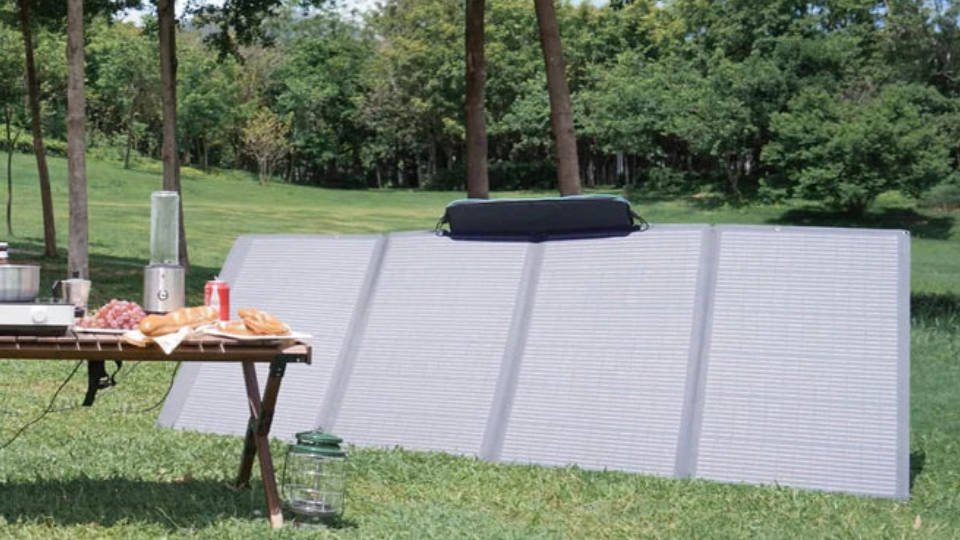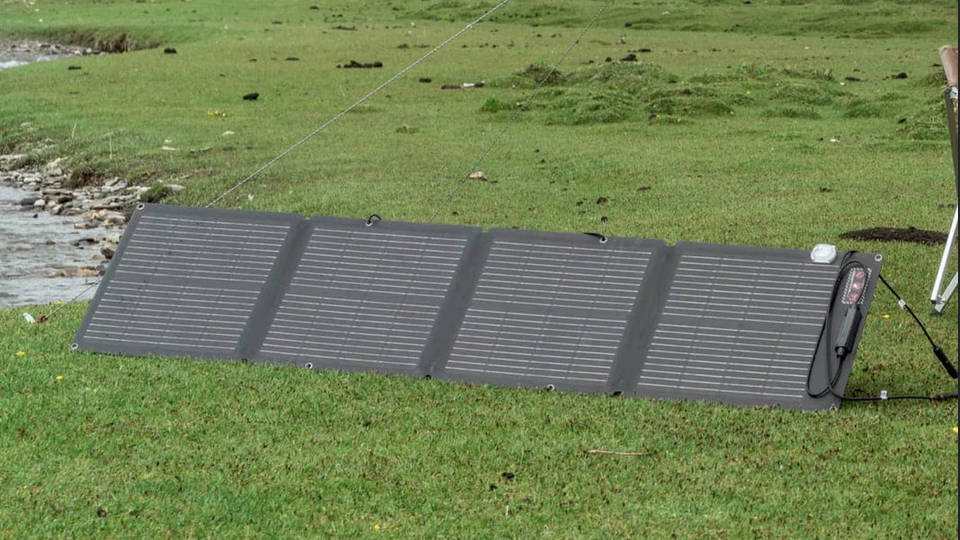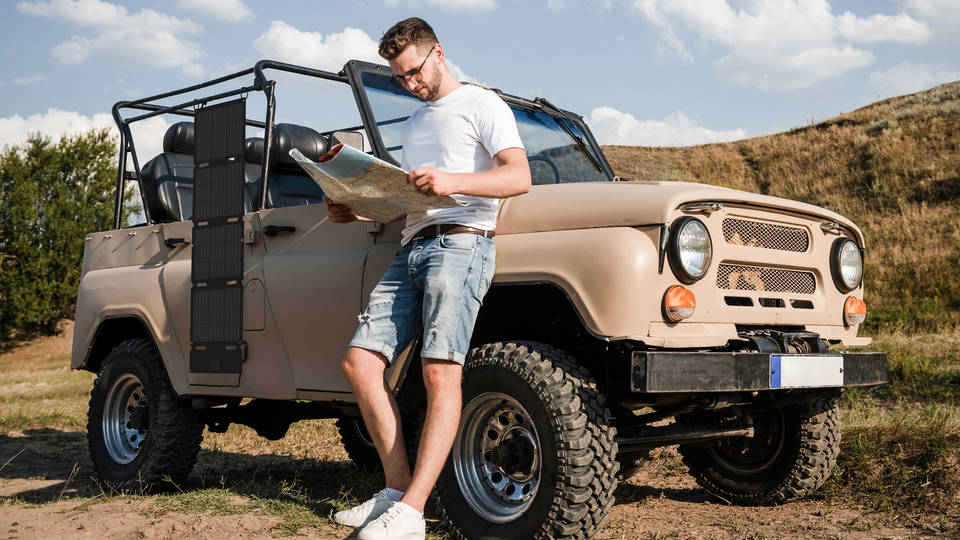Silent, Clean, & Always Ready: Best Solar Panels for Camping Redefine Portable Power
When heading outdoors for camping, having a reliable power source is essential. The best solar panels for camping offer a clean, renewable energy solution that ensures you can keep your devices charged and stay connected, all while minimizing your environmental impact. These solar panels are not only efficient but also portable, durable, and easy to set up, making them ideal for off-grid adventures. In this guide, we'll explore key factors to consider when choosing the right solar panel for your camping needs, helping you select the perfect system to power your outdoor activities.
Why Choose Solar Panels for Camping?
Solar panels for camping are an excellent solution for powering your devices and extending your time off-grid. Best solar panel for camping offer a clean, quiet, and renewable energy source, enabling you to enjoy nature without the noise and fumes of traditional generators. Portable solar panels provide independence from mains power, allowing you to maintain battery charge indefinitely in remote locations, freeing you from the need for electrical hookups. After the initial purchase, sunlight is a free energy source, leading to significant cost savings by eliminating campground electricity fees and reducing fuel costs associated with generators. Quality camping solar panels require minimal maintenance as they have no moving parts, typically only needing occasional cleaning and connection checks. Their versatility allows them to power a wide array of devices, from smartphones and LED lights to 12V refrigerators and laptops, making them an essential part of the best solar power for camping setup.
Key Features to Look for in Solar Panels for Camping
When selecting the best solar panel for camping, several critical factors ensure you get a reliable and efficient power solution for your outdoor adventures. These considerations will help you determine the best solar power for camping setup for your needs.
Assess Your Energy Requirements
Before choosing a solar panel, it's essential to understand how much energy you'll need. Begin by listing all the devices you plan to power, their wattage, and how many hours you intend to use them daily. Adding a 20% buffer to account for inefficiencies or unexpected usage is also a good idea.
For example, a 200W panel can typically generate 600-800 watt-hours (Wh) per day, which is enough to power LED lights for over 100 hours or a laptop for up to 16 hours. For a 12V fridge, a 200W panel can run it for several hours, depending on consumption and sun exposure. A general rule is to have at least 20% more power input than your estimated daily usage.
Choose the Appropriate Panel Type
There are various types of solar panels, and the right one depends on your specific needs:
Monocrystalline panels are known for their high efficiency (18% to 23%, and up to 25% with TOPCon technology), making them effective even in low-light conditions and ideal for limited space. Many LiFePO4 solar battery setups are paired with monocrystalline panels for enhanced energy efficiency.
Polycrystalline panels are generally more affordable but slightly less efficient (13-16%).
Thin-Film panels are lightweight and flexible but offer lower efficiency and durability, though their high watts-per-kilogram ratio makes them ideal for weight-saving.
Bifacial solar panels, like EcoFlow's NextGen series, capture light from both sides of the panel, increasing efficiency by up to 25%.
Durability and Weather Resistance
Durability is a critical factor when selecting solar panels for camping. Look for panels made with robust construction materials like tempered glass and corrosion-resistant frames, which can withstand various environmental conditions. Many modern portable solar panels come with high Ingress Protection (IP) ratings, such as IP68, indicating strong resistance to dust and water. This makes them reliable even in humid, wet, dry, or dusty environments, and ensures they perform well during downpours.
Consider Portability and Installation
The portability of your solar panel is crucial for camping. Folding designs are common, allowing for easy transport and storage. These often include integrated stands or kickstands for easy setup and optimal sun exposure. Fixed panels, typically installed on vehicle roofs, provide a "set-and-forget" convenience but can limit optimal sunlight if parked in shaded areas.
Flexible solar panels are ultra-thin, lightweight, and can contour to surfaces, reducing weight and air drag. Solar blankets are also highly portable, flexible, and can be draped over surfaces like awnings or car hoods, making them an ideal choice for campers who need quick energy solutions.
Solar Regulator and Controllers
A solar regulator (charge controller) is an essential component of your solar setup. It manages power flow from the panel to the battery, preventing overcharging and ensuring efficient energy use. MPPT (Maximum Power Point Tracking) controllers are more efficient than PWM (Pulse Width Modulation) controllers, especially in low-light conditions, increasing performance by up to 30%. Some portable solar panels even come with built-in regulators, making them more convenient for quick setups.
Check the Warranty
Always check the warranty provided by the manufacturer. A robust warranty—such as a minimum 2-year repair/replacement warranty or a 25-year performance warranty guaranteeing 80% of rated wattage—shows confidence in the product’s quality and longevity. This is particularly important when investing in a LiFePO4 solar battery, as it ensures both the panel and battery setup will stand the test of time.
4 Best Solar Panels for Camping
Choosing the best solar panels for camping depends on your specific power needs and portability requirements. EcoFlow offers a range of portable solar panels that cater to various camping scenarios, from light weekend trips to extended off-grid adventures. These best portable solar panels for camping australia are designed for high efficiency and durability in diverse outdoor conditions.
EcoFlow 400W Portable Solar Panel
Designed for heavy power needs, making it ideal for RVs, home backup power systems, or remote workstations. EcoFlow 400W Portable Solar Panel offers a high solar output of 400W and a conversion efficiency rating of up to 23%. This panel is built from durable, multi-layered, and flexible materials, providing high impact resistance for rugged outdoor use. It is also weather-resistant with an IP68 waterproof rating, meaning its solar cells can withstand humid, wet, dry, and dusty environments, and can continue to collect energy even during a downpour. Despite its high output, it features a convenient folding design and weighs approximately 16.0 kg (panel only) or 19 kg (with kickstand case), allowing for effortless carrying to a campsite and compact storage. The carry case includes a rigid layer to protect the panel from overbending. For extended power, you can connect up to three 400W portable solar panels with a DELTA Pro portable power station for a total input of 1600W.

EcoFlow NextGen 220W Bifacial Portable Solar Panel
Standing out with its dual-sided design, capturing ambient light from both the front (220W) and rear (175W) sides. EcoFlow NextGen 220W Bifacial Portable Solar Panel with its innovative feature allows it to collect up to 28% more solar energy compared to traditional single-sided panels, boosting efficiency by up to 25% in optimal settings. It integrates TOPCon solar technology, setting a new standard for conversion efficiency at 25%. The panel comes with a newly integrated solar angle guide and a 30-60° adjustable stand, allowing users to quickly set the optimal angle for maximum sun exposure. Constructed with durable tempered glass and an ETFE coating, it boasts an IP68 waterproof rating, ensuring high performance even in contact with water and resistance to high temperatures. Weighing approximately 7.0 kg, it is lightweight and compact when folded, making it ultra-portable for various adventures.
EcoFlow 110W Portable Solar Panel
As a versatile option for renewable energy wherever you go, EcoFlow 110W Portable Solar Panel features an industry-leading 23% conversion rate and is approximately 10% smaller and far lighter than similar portable solar panels, ensuring a faster, easier charge. Its self-supporting design includes a case that doubles as a kickstand, allowing you to prop up the panel at the ideal angle for maximum solar coverage. This seamless panel is built for durability with an IP68 waterproof rating, making it submersible up to a meter for 30 minutes, and an ETFE film that protects against ultraviolet rays. When not in use, it folds into a compact size (48 x 42 x 2.4 cm) and weighs 6 kg, saving valuable trunk space and making transport convenient. A single 110W solar panel can charge a DELTA portable power station in 16-32 hours or a RIVER 370 in 5-10 hours, depending on conditions.

EcoFlow 45W Portable Solar Panel (Type-C)
EcoFlow 45W Portable Solar Panel (Type-C) is an extremely compact and lightweight solution, ideal for small power needs and direct device charging. It is an excellent companion for EcoFlow RIVER Series power stations. This panel incorporates TOPCon solar technology, achieving a conversion efficiency of up to 25%, which allows for faster charging in a more compact form. It uniquely includes a Type-C output port (up to 15W) for direct charging of devices like phones, laptops, and air pumps. The panel's folding four-panel structure significantly reduces its size when folded (222x309x45 mm), allowing it to fit easily into backpacks, SUVs, or minivans. With a robust PCB fiberglass and durable ETFE coating, it has an IP68 waterproof rating, making it resistant to challenging weather conditions, sudden impacts, wind, and even salty ocean spray. It also features pre-cut eyelets and hooks for hanging on vehicles, tents, or backpacks, enabling charging while on the go.

Conclusion
Choosing the best solar panels for camping empowers you to explore off-grid locations with reliable, clean, and silent energy. From portable folding panels to fixed rooftop installations and flexible solar blankets, there's a solution to fit every traveler's needs and energy requirements. By considering factors such as energy consumption, panel type, efficiency, durability, and the presence of a proper solar regulator, you can make an informed decision for your camping solar panels. Investing in high-quality solar panel for camping not only provides independence and convenience but also contributes to cost savings and a reduced environmental footprint, making solar power the best solar power for camping adventures.
FAQs
What is the best solar panel system for camping?
The best solar panels for camping system depends on your specific needs, duration of trips, and devices to power. Portable folding solar panels or solar blankets are excellent for versatility and mobility, allowing you to "chase the sun". For larger needs or semi-permanent setups like RVs, fixed panels or high-output portable options (e.g., 400W) combined with a robust battery and MPPT charge controller are ideal.
Is 200W solar enough for camping?
A 200W solar panel for camping is often sufficient for small to medium energy usage. It can typically generate 600–800 watt-hours (Wh) of electricity per day under optimal conditions. This is enough to power essentials like LED lights (100+ hours), charge a laptop (up to 16 hours), or run a 12V refrigerator for several hours, especially when paired with a suitable battery. For basic needs, an 80W panel might suffice, but a 200W or 250W panel is recommended to compensate for variables like weather and additional gadgets.
What size solar panel should I get for camping?
The size of the solar panel you need depends on the devices you want to power and the length of your trip. For light use, such as charging a phone or running LED lights, a 100W to 200W solar panel is usually sufficient. For longer trips or powering devices like a 12V fridge, consider a 300W to 400W panel. If you're in a remote area or need more power, a 500W panel or higher might be necessary. Australia's sunny climate makes solar a great option, but it's always good to have a bit more capacity for cloudy days.